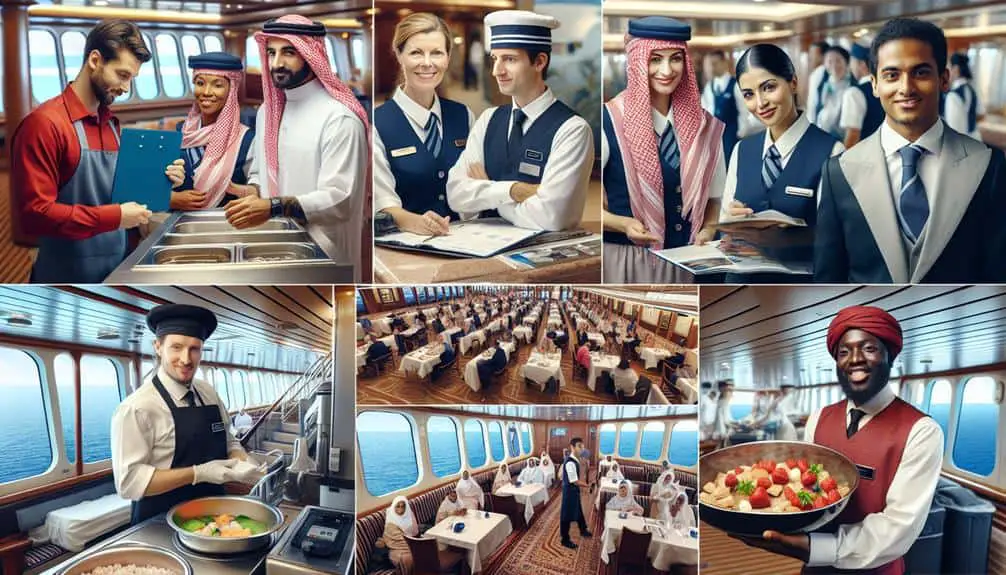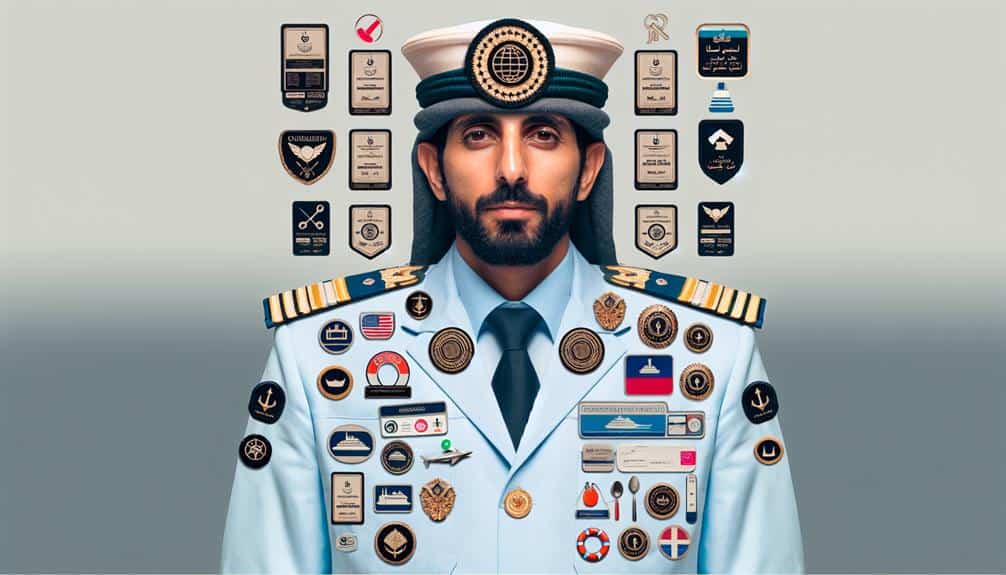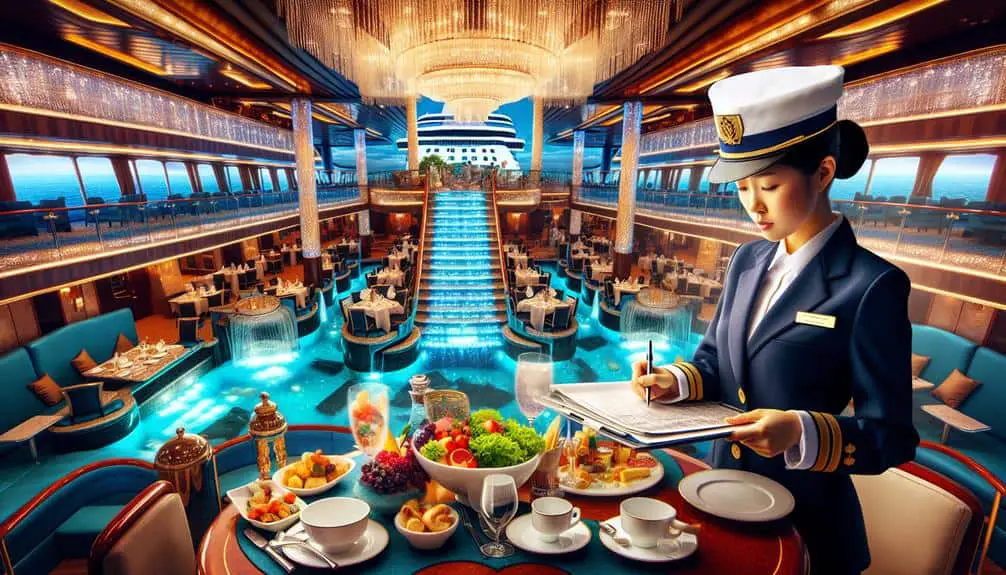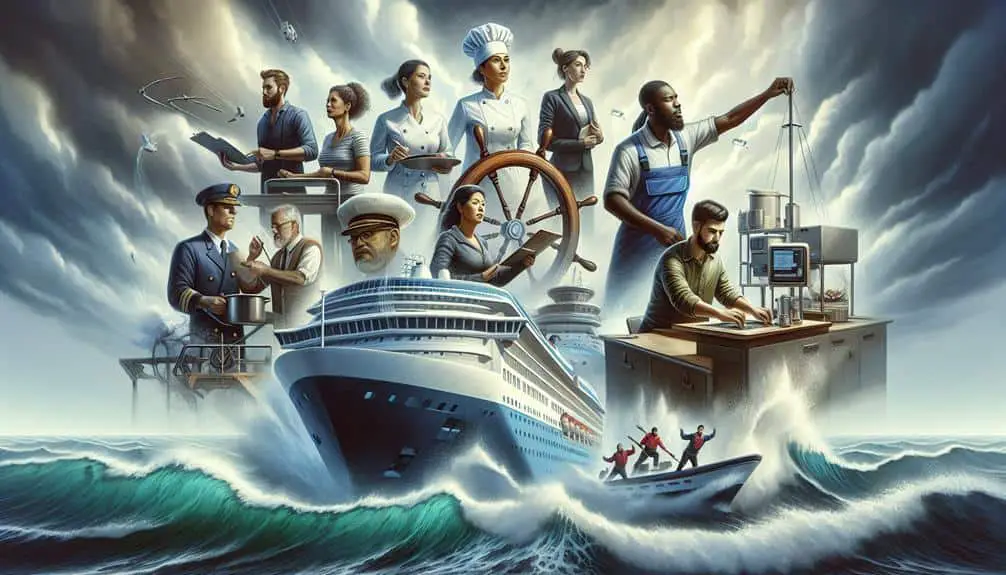Step into the world of cruise ship crew members who handle guest services, from ensuring exceptional hospitality to staff training. They are also rigorously trained in safety and emergency procedures, conducting regular drills and managing various emergencies. Additionally, they meticulously maintain cleanliness, uphold hygiene standards, and assist in menu planning and food service with finesse. Beyond that, they plan events, coordinate activities, and create entertainment programs. Interested to discover more about the diverse job duties of these dedicated crew members?
Key Points
- Supervise guest services and ensure exceptional hospitality standards.
- Conduct regular emergency drills to handle various emergencies efficiently.
- Maintain high cleanliness standards through meticulous housekeeping tasks.
- Serve diverse culinary options with finesse and attention to detail.
- Coordinate entertainment events and activities for passenger enjoyment.
Guest Services Management
When supervising guest services on a cruise ship, your main responsibility is to ensure exceptional hospitality for passengers throughout their voyage. Customer satisfaction is paramount in guaranteeing that guests have a memorable and enjoyable experience onboard. To achieve this, you must oversee staff training to make sure that all team members are well-versed in providing excellent service. Staff training plays a vital role in maintaining high standards of customer satisfaction, as well-trained crew members are better equipped to anticipate and meet the needs of passengers.
Effective staff training involves imparting knowledge about the ship's amenities, dining options, entertainment offerings, and excursion opportunities. Crew members should also be trained in communication skills, problem-solving techniques, and conflict resolution strategies to handle any guest concerns or complaints promptly and professionally. By investing in thorough staff training, you can create a customer-centric culture onboard that prioritizes exceptional service and ensures that passengers feel valued and well-cared for throughout their cruise experience.
Safety and Emergency Procedures
Guaranteeing the safety and well-being of passengers and crew members on a cruise ship involves comprehensive training in emergency procedures and protocols. Safety protocols are meticulously crafted to prepare crew members for any potential crisis at sea. Emergency drills are regularly conducted to simulate various scenarios and guarantee a swift response in case of an actual emergency.
Cruise ship crew members undergo extensive training to handle different types of emergencies, such as fires, medical incidents, or even man overboard situations. They're trained to remain calm under pressure and to prioritize the safety of all individuals on board.
During these drills, crew members are assigned specific roles and responsibilities to efficiently manage the situation. Clear communication and coordination among the crew are crucial elements in executing successful emergency procedures.
Housekeeping and Maintenance Tasks
Housekeeping and maintenance tasks on a cruise ship demand meticulous attention to detail and unwavering dedication to cleanliness and functionality. As a crew member responsible for these duties, you play an essential role in guaranteeing that the ship's accommodations are in excellent condition for passengers. Room inspections are a routine part of your day, where you meticulously check for cleanliness, proper amenities, and any maintenance issues that need addressing.
Cleaning is a significant aspect of your role, encompassing tasks such as making beds, vacuuming carpets, and sanitizing bathrooms to uphold high standards of hygiene. Additionally, you may find yourself performing equipment repairs to keep everything running smoothly. From fixing a leaky faucet to painting over scuffed walls, your attention to detail is key in maintaining a pristine environment for guests.
Your commitment to excellence in housekeeping and maintenance tasks contributes to the overall positive experience of passengers on the cruise ship. Your efforts ensure that every corner of the ship isn't only clean but also functioning seamlessly.
Food and Beverage Service
As you navigate your role on a cruise ship, the domain of food and beverage service offers a vibrant and dynamic aspect to your daily responsibilities. Menu planning is an important part of your duties, where you collaborate with chefs to curate diverse and enticing options for passengers. Your service skills come into play as you deliver these culinary creations with finesse and attention to detail, ensuring a memorable dining experience for guests.
Additionally, you may find yourself involved in bar operations, where you mix and serve drinks with precision and flair. Understanding bar etiquette is essential, as you interact with passengers from around the world, catering to their preferences and providing high-quality service.
Whether you're orchestrating a themed dinner event, recommending a wine pairing, or crafting the perfect cocktail, your expertise in food and beverage service elevates the overall guest experience on the cruise ship. Your ability to execute these tasks with professionalism and enthusiasm enhances the journey for all who come aboard.
Entertainment and Activities Coordination
Embark on a journey of creativity and excitement as you take on the role of coordinating entertainment and activities aboard the cruise ship. As part of the entertainment and activities coordination team, your responsibilities include event planning, team building, program scheduling, and talent booking.
Event planning is an important aspect of your role. You'll be tasked with organizing various onboard activities such as themed parties, live music performances, comedy shows, and interactive workshops. Attention to detail and creativity are vital to make sure guests have a memorable experience.
Team building activities are also part of your responsibilities. Coordinating team games, sports competitions, and collaborative challenges can enhance the onboard atmosphere and foster a sense of community among guests.
Program scheduling involves creating a diverse and engaging daily itinerary for passengers. Balancing entertainment options to cater to different tastes and age groups is crucial to keeping guests entertained throughout their cruise.
Moreover, talent booking plays a significant role in securing performers and guest entertainers. Collaborating with artists, musicians, and other performers to deliver high-quality shows adds value to the onboard entertainment experience.
Frequently Asked Questions
How Do Cruise Ship Crew Members Handle Medical Emergencies on Board?
In medical emergencies on a cruise ship, crew members swiftly enact emergency procedures, ensuring clear communication. They utilize advanced medical equipment, prioritizing rapid response times to provide critical care to passengers in need.
What Training Do Cruise Ship Crew Members Receive in Dealing With Difficult Passengers?
When dealing with difficult passengers, cruise ship crew members undergo training in conflict resolution, customer service, de-escalation techniques, and communication skills. These skills enable you to address challenging situations effectively and provide exceptional service.
How Are Crew Members Assigned to Specific Areas or Departments on a Cruise Ship?
When you join a cruise ship crew, your assignments are carefully planned to match your skills and training. Regular department rotations guarantee you gain diverse responsibilities, making your experience on board both challenging and rewarding.
What Measures Are in Place to Prevent Theft or Security Breaches on a Cruise Ship?
To maintain safety at sea, security protocols on cruise ships involve thorough checks, controlled access areas, and vigilant surveillance systems. Crew members play an essential role in monitoring for theft and preventing security breaches.
How Do Crew Members Handle Cultural or Language Barriers When Interacting With Passengers From Different Countries?
When interacting with passengers from diverse backgrounds, crew members navigate cultural and language barriers adeptly. They employ language translation services, show cultural sensitivity, and provide exceptional customer service to guarantee a seamless and enriching experience for all travelers.




